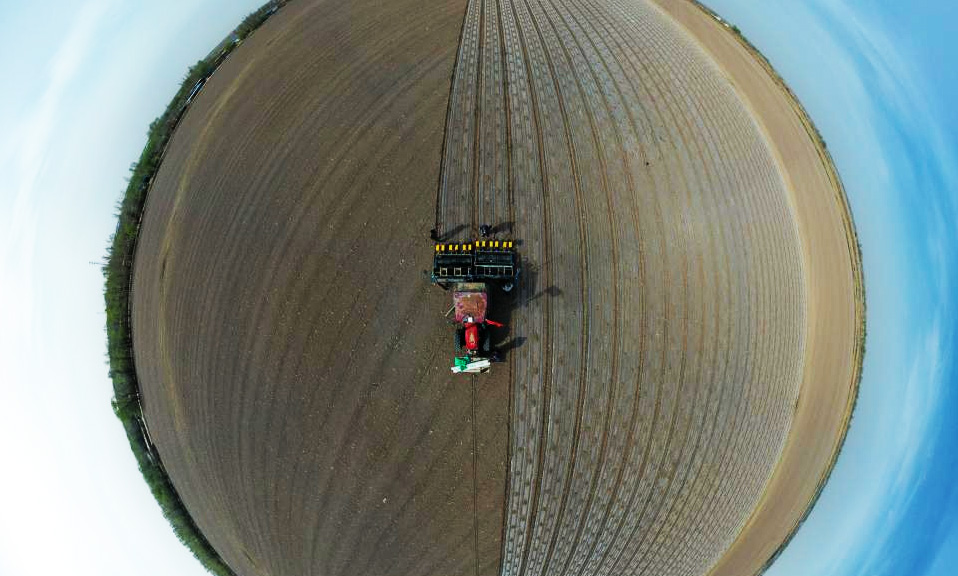Country's growth to get further policy support
China needs and has space for policy support to respond to economic headwinds in order to make progress toward meeting its growth target, a senior official of the International Monetary Fund said on Thursday.
The nation's 4.8 percent GDP growth rate in the first quarter was higher than the consensus forecast and "surprised many people", Krishna Srinivasan, deputy director of the IMF's Asia and Pacific Department, told China Daily.
In the latest World Economic Outlook, released on Tuesday, the IMF forecast that China's economy would grow 4.4 percent this year, which is 1.1 percentage points lower than the target of around 5.5 percent set by China last month.
Srinivasan pointed to the negative influences on the economy from the Ukraine crisis and the COVID-19 pandemic.
"To make progress toward the target of around 5.5 percent, more policy, notably fiscal, support has to be provided by China," he said.
He noted that the Chinese government has provided policy support, both monetary and in the budget, but more focused fiscal support is necessary. "When we're talking about fiscal support, it's not just about the quantity of fiscal support, but also the composition of fiscal support," Srinivasan said.
His suggestions include shifting spending from traditional infrastructure investment to spending that boosts private consumption, which would help rebalance the economy and support carbon reduction. Such support can focus on providing direct transfers to vulnerable households.
Srinivasan noted that inflation in China is currently "pretty well contained". "That actually makes the case easier for China to provide further support to the economy because you don't see inflation pressures the way you see in some other countries in Asia," he said.
"Fortunately, China has the policy space to provide additional macro-policy support, so that's good news there," he added.
Economic forecast
According to the IMF's World Economic Outlook, the global economy "worsened significantly" since the start of the year, mainly due to the Ukraine crisis and the sanctions imposed by the US and other countries. The report projected that global growth will slow from an estimated 6.1 percent in 2021 to 3.6 percent in 2022 and 2023, downgrading 0.8 and 0.2 percentage point respectively from its forecast in January.
The report revised the forecast for GDP growth in the Asia-Pacific region down to 4.9 percent in 2022. However, even after this revision, Srinivasan said that it remains one of the fast-growing regions.
Srinivasan added that while the impact of the pandemic on global long-term potential is still being felt, the Ukraine crisis poses an additional headwind. According to his analysis, the Russia-Ukraine conflict has influenced the global economy, including the Asia-Pacific region, largely through commodity price rises, disruptions to trade, and a tightening of financial conditions.
He said that the extent of policy trade-offs varies in different countries in response to the shocks, and there is no one-size-fits-all policy package that would suit all countries.
In the short term, he said that fiscal policy should generally aim to protect the vulnerable from rising food and fuel prices, but consolidation is essential in the context of a credible medium-term framework, while beyond this, structural reforms are important to support long-term growth.
"So government should currently navigate a fine balance between ensuring access to food and energy for vulnerable households on the one hand, and normalizing policy support, promoting green transformation and energy security on the other hand," Srinivasan said.
The supply chain crisis is another difficult problem to solve in the shadow of the pandemic and the Ukraine crisis, which Srinivasan described as "one crisis on top of the other crisis".
He mentioned that the conflict led to major disruption and the shortage of several commodities, raising inflation worldwide. He expressed his concern that if it continues, there would be broader implications, leading to widening geopolitical tensions resulting in longer-term costs and significant disruptions.
"As the pandemic wanes and the war ceases, you will have a positive effect on supply chains, but until these shocks persist, they're going to have a significant impact on supply chains," said Srinivasan.
Regarding sanctions imposed by the US and other Western countries that targeted Russia, Srinivasan said the IMF's projects a sharp decline in Russia's growth from 4.7 percent in 2021 to minus 8.5 percent in 2022.
While a deep recession appears inevitable in 2022, there is significant uncertainty around the outlook and the impact of sanctions. They create "sand in the wheels" together with reputational risks in dealing with Russia, all of which will likely have an impact on exports, though how large is unknown at this stage.
"One would hope that what we take away from these shocks, the pandemic and the war in Ukraine is not to have more fragmentation, but to have greater integration across countries, which would strengthen supply chains and so on," said Srinivasan. "One would hope that the lessons we learn are that greater integration, greater multilateralism is good for everyone."
Photos
 Young artist takes up brush to create lifelike paintings expressing mankind and nature’s harmonious co-existence
Young artist takes up brush to create lifelike paintings expressing mankind and nature’s harmonious co-existence Cutton farming in full swing in China's Xinjiang
Cutton farming in full swing in China's Xinjiang Spring scenery along section of Grand Canal in Beijing
Spring scenery along section of Grand Canal in Beijing New faces called up for Chinese national women's volleyball team while Zhu Ting missing
New faces called up for Chinese national women's volleyball team while Zhu Ting missing
Related Stories
- Economic Watch: Racing against COVID-19, China strives to bring economy back on track
- Interview: China's economy grows despite int'l challenges: expert
- Commentary: China confident in ensuring stable economy amid COVID-19 pandemic
- Reasons to stay optimistic on Chinese economy
- China's central SOEs record growth in R&D spending
Copyright © 2022 People's Daily Online. All Rights Reserved.






